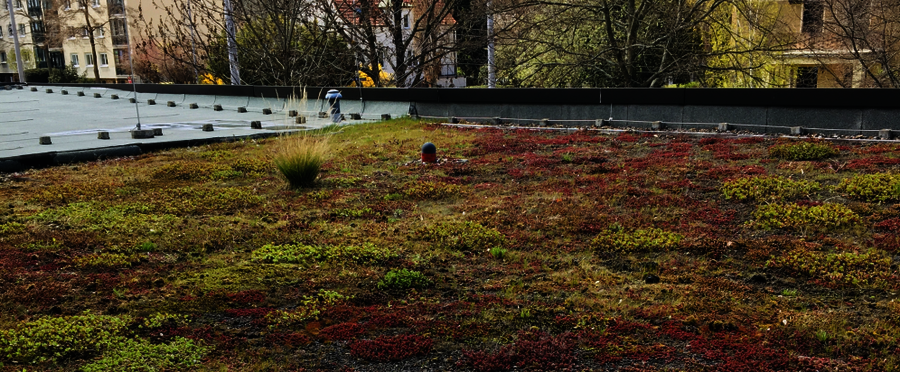Buildings and outdoor facilities – refurbishment and design according to environmental standards

In terms of its buildings, the IOER offers the best conditions for environmentally friendly work: The institute's building from the 1970s was gradually renovated in terms of energy efficiency. The new extension was built in 2011 in compliance with high environmental standards. For this, the IOER received the European Commission's GreenBuilding Award in the "Modernization" category. In the course of the renovation, the outdoor facilities of the IOER were also redesigned according to ecological standards – insect-friendly, low-watering, and low-maintenance. Part of the building roof was covered with greenery where statically possible. On the initiative of the staff, part of the site has also been transformed into a flowering meadow, which is maintained by committed employees.
Climate-neutral building operation – photovoltaics, green electricity, district heating
The use of a photovoltaic system with a gross output of 38.5 kWp on the roof of the institute building, as well as certified green electricity and district heating from combined heat and power, enables the IOER to cover the building's energy requirements from renewable energy sources. As a result, and due to the renovated building envelope, the institute building is climate-neutral in terms of building operation. Information on energy consumption and the performance of the solar system is continuously provided at the institute.
Monitoring of consumption data – basis for further improvements
By monitoring, important consumption data (e.g., electricity, water, district heating) are continuously recorded and used for internal energy and climate impact assessments. Further measures for the possible expansion of an energy-positive building envelope are being examined. Within the framework of the pilot project "Climate-neutral research operation" funded by the Leibniz Association, the IOER has also set itself the goal of preparing a comprehensive greenhouse gas (GHG) balance sheet that takes into account the Greenhouse Gas Protocol standards (Scope 1/2/3).



![[Translate to English:] Leibniz Gemeinschaft](/fileadmin/user_upload/ioer_de/img/logo-leibniz-gemeinschaft.svg)
![[Translate to English:] Dresden concept](/fileadmin/_processed_/2/1/csm_logo-dresden-concept_430c661ad7.png)

